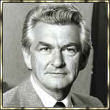

Born in Bordertown, South Australia, Hawke graduated in law and economics from the University of Western Australia and was that state's Rhodes scholar in 1952.
In 1955 he graduated Bachelor of Letters from Oxford. Back in Australia he joined the Australian Council of Trade Unions (ACTU) in 1958, working first as a researcher, then as a union advocate before the Arbitration Commission.
In 1970 he became president of the ACTU and for the next ten years was the most prominent figure in the trade union movement, with a reputation as a hard negotiator and an effective settler of disputes. He was also president of the Australian Labor Party from 1973 to 1978.
Hawke entered federal parliament in 1980 as the Labor member for Wills in Victoria, having resigned form the ACTU. He finally made a successful bid for the Labor leadership in February 1983, replacing Bill Hayden. The same day Prime Minister Malcolm Fraser called an early election.
The electors voted Labor in and Hawke became prime minister. His government was returned at election in 1984, 1987, 1990. He thus became the first Australian Labor prime minister to be elected for a third (and a fourth) term and the longest-serving Labor prime minister.
In mid 1991 he was challenged for the Labor leadership by Paul Keating, who claimed that Hawke had reneged on a agreement made with him about the transfer of the leadership before the 1990 election. Hawke won the ballot but in December 1991, he was forced to call a leadership vote and was narrowly defeated by Paul Keating. He resigned from parliament in early 1992.
With eight years in office, Bob Hawke was Australia's longest-serving Labor Prime Minister. He became Prime Minister after only two years in parliament, and only one month as Leader of the Opposition.
Building on his success as trade union president, Hawke established consensus with unions and business to stabilise wage growth, improve the ability of business to compete in global markets and to deregulate the Australian economy and promote growth.
All Rights Reserved.